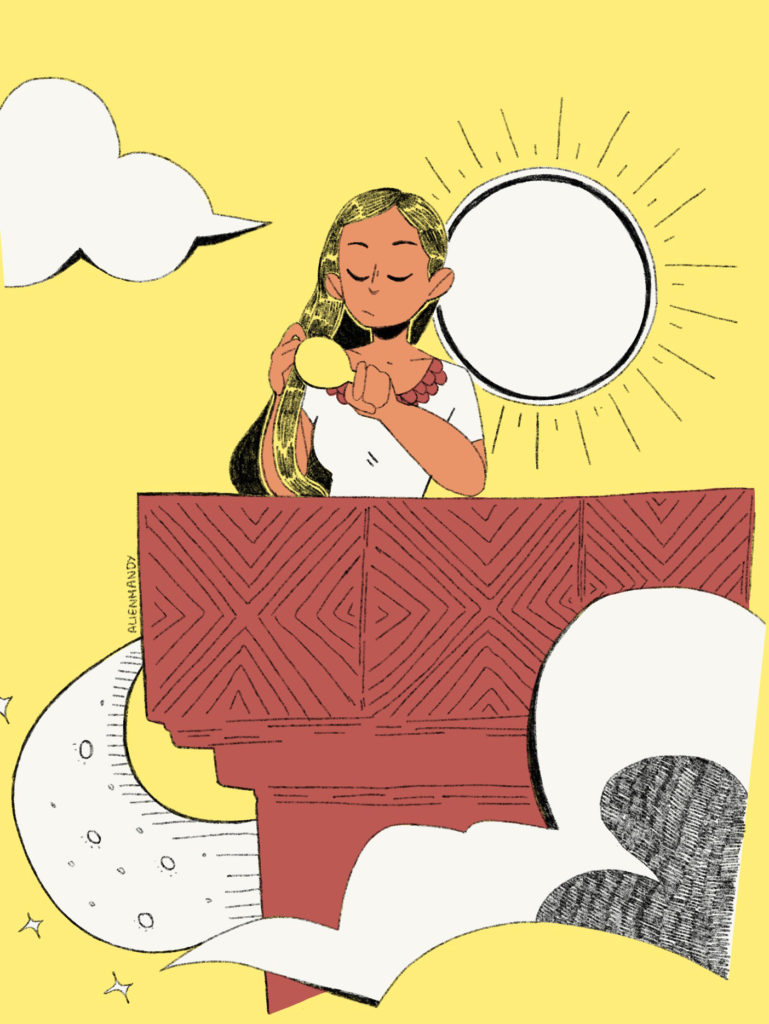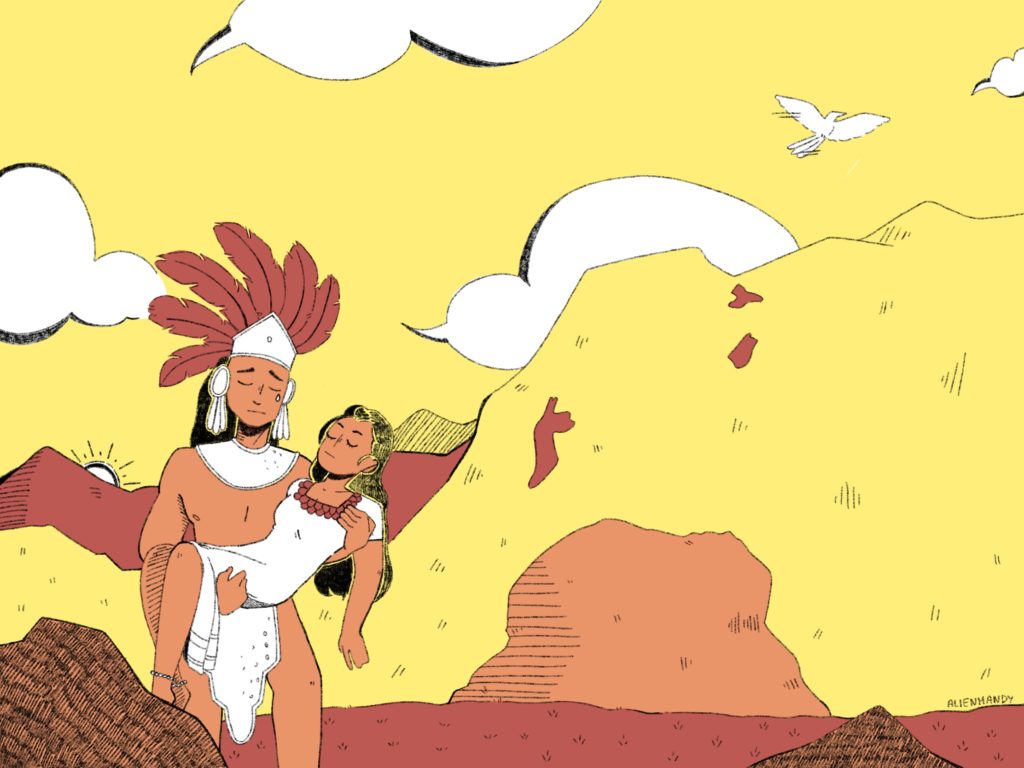Once upon a time, there was a beautiful princess called Izta.
Izta was lonely. A war between three kingdoms was taking place and it seemed it would never end. Her two older brothers were both away on the battlefield. Her father the King had only tears for her, even though Izta sang the most beautiful songs to try to make him smile. The King knew his daughter needed her brothers. He knew she needed a husband, but all the worthy warriors were on the battlefield, along with her brothers. He knew his fair daughter needed her mother, but the Queen was dead and her ashes were spread on the battlefield.
At the end of every day, at exactly five o’clock and just when the Sun was yawning and stretching his arms, Izta stepped onto the balcony and combed her long black hair. The Sun, knowing that she was sad, kissed her on the cheek before going to bed. The Moon, before standing at the top of the world, tickled her feet and caressed her long black hair. That’s why it always had a silvery shine.
And so, time passed by, the war raged on, and Izta’s heart began to break. She forced a smile for her ageing father and for the poor women left alone in town. She forced a smile for the fatherless children who fought with wooden sticks to prepare for the war. But the Grey Eagle brought no news from the battlefield, and Izta feared the worst.

One day, at last, the flowers opened their eyes, the trees shook their leaves, the air smelled of fresh corn bread, and the water in the creek chirped again. The Grey Eagle soared in the sky and the Sun gave great news to the King and his beloved daughter. The women and children of the town gathered at the doors of the castle, and a few hours later, the warriors returned home. Smiles illuminated the faces of the children who saw their fathers after three years. Tears ran down the faces of the young women whose husbands did not return. For just a few minutes the kingdom seemed to be free.
But no one was waiting for the warrior Po, and no one noticed when he entered the castle. Po felt guilty. He had not managed to save Izta’s brothers during the Battle of the Moonflowers.
♦
On that bloody night, the stars had gone to sleep. The Moon had been blinded by the clouds. The crickets had not chirped. A peaceful night lullabied the warriors into a deep sleep. And when the soldiers of the other two kingdoms heard the silence, they decided to attack the Moonflowers’ camp.
No one heard them move, and the ground did not tremble when they marched with all their might towards their enemies.
The still-sleepy warriors opened their eyes to see the capture of their two beloved princes. Po aimed his arrows at the hearts of the enemy soldiers, but a sword went straight through his leg and an arrow pierced his arm before he could prevent their deaths.
In the aftermath of the battle, the Sun hid for a day and the tears of the weeping flowers followed the moonbeams to the site where the dead princes lay. A fire transformed them into ashes, and they were scattered, like their mother, on the battlefield.
Po spoke with the leaders of the other two kingdoms and asked for a truce. His enemies knew that the decision to surrender was not his and gave him three days to visit his kingdom. In exchange for this gesture, and to assure prosperity and peace, the King of Cron demanded one more thing: “Tell your King that his daughter, Izta, shall marry my son.”
♦
From her balcony, Izta saw the smiles on everyone’s faces. The children were laughing and the young warriors were happy. She was waiting for her brothers and when she heard footsteps, she hurried to her father’s chamber to greet them.
But from the corner of her eye, Izta saw Po. She recognised his black hair and lean arms covered in green feather tattoos. He stopped before the King’s chambers, swallowed and opened the door with his right hand. Po bowed his head. The King was standing with his back towards him, staring at the window; his body was sad, his heart torn and in his left arm he held the sword of his eldest son like an old ragged doll.
Po approached his king and when he turned around, the warrior handed him a brown feather from his youngest’s son crown. A cry of sorrow flooded Izta’s ears. She walked towards her father as if trying to stop time, holding to the memory of her brothers, the years when she was the youngest daughter; afraid of the tidings, aware of her future. She touched her brother’s sword and a tear timidly left her eye. “The King of Cron wants to end the war and make an alliance with our kingdom. His son wants to marry our princess,” Po said, and turned around to meet Izta’s gaze, her brown eyes looking like those of a fish who had just been taken out of the water. He bowed his head again and told her: “Your brothers are with your mother.”
Izta recognised sweetness in Po’s eyes, his broken heart glowing red. She thought about her brothers and mother, their ashes once alive now at peace with the land, welcoming fallen warriors on their way to the Mictlán, the underworld. Before her death, Izta’s mother had foretold of a mighty warrior who would rescue their kingdom from ruin and become her husband. “A warrior with light footsteps and a heart glowing red,” she had said.
The King saw the spark in Izta’s and Po’s eyes and thought about his wife, but his ageing heart was blinded by fear. “Tell the King of Cron that Izta will marry his son. She will be ready in ten days.”
Izta implored her father to be kind, to let her stay home with him and her people, but the King did not listen and ordered Po to leave immediately to deliver the news to Cron. But the warrior disobeyed his King and spent the rest of the day in the garden, waiting for Izta to step onto the balcony and comb her hair. Po admired her beauty, her strength. And when their eyes met, a pact was made.
The next morning, the King prepared to announce the engagement of his daughter and pronounce the war was finally over. But when he summoned Po to his chambers, he begged for one last chance. “Let me be the one to rescue our kingdom from Cron’s greed. Let me fight for your daughter’s future,” Po said. “She does not need to sacrifice for us.”
The King considered. “You have five days to end this war. If you fail, Izta will marry Cron’s son and you will not be welcomed here again. But if you win, then my son you shall become.”
 And so, the returned warriors said goodbye to their children once more, kissed their wives farewell, and carried their arrows and spears. Hope spread to every corner of the kingdom that the war would soon be over.
And so, the returned warriors said goodbye to their children once more, kissed their wives farewell, and carried their arrows and spears. Hope spread to every corner of the kingdom that the war would soon be over.
But Izta’s heart was untouched by hope. Her cheeks flooded with tears, and neither the Sun nor the Moon could make her happy. The flowers tried to console her, but nothing made her smile. Her heart was broken and the fear of never seeing Po again, and having to marry someone else, was tearing her spirit apart.
Five days went by, and nothing changed. The Grey Eagle did not soar in the sky to spread good news. Everything was silent. But the Wind whispered to the King that Po was fighting with all his might. The King told Izta the secret, but she did not believe it.
Another five days went by. The women stopped laughing, the children ceased playing, the flowers lost their petals, and the Sun stopped visiting. Everything was silent. The Wind came back to visit the King and whispered that Po was still fighting, but no one believed it. They wanted to see the Grey Eagle soaring in the sky.
On the twentieth day, the kingdom lost its colours and sounds. The good tidings never arrived, and the Wind did not come back.
Hope vanished from the kingdom, and Izta closed her eyes forever.
Her chambermaids dressed her in white and braided her long black hair. They placed her on a bed of weeping flowers. The entire town dressed in black to pay their respects one last time. The King lost all hope and his heart filled with rage. Po, who had promised to save his kingdom and marry his daughter, would have to pay.
But the very next day, the Great Eagle soared, and scent of triumph filled the air. Po and his warriors returned to the town with pride, almost glowing. They did not realize that the women did not clap for them and the children did not smile. When they entered the castle, they saw the King sitting by himself. “Freedom has been restored to our kingdom,” announced Po. But the King only stood up, grabbed his hand and guided him to Izta’s chamber, where she still lay on the weeping flowers.
Po’s despair was felt in every house, in every heart. A bolt of rage and sadness, red; unstoppable.
He kissed Izta on the forehead, and without saying a word, carried her in his arms. As the royal couple that never was walked down the town’s main street, women, men and children waved goodbye to them. Po walked . The ground was soft and held his tumbling steps all the way to the top of the mountain, where he laid Izta’s body. After kissing her forehead once more, Po climbed down; but instead of going back home, he climbed to the summit of the mountain next to Izta’s and lay down to keep her company.
That night a snow blizzard covered the Earth. The next morning, when everyone stepped outside their houses, they saw the figures of Izta and Po sleeping on top of the mountains. They were peacefully resting, overseeing their kingdom, thereafter free.
Mexico City is located in a valley surrounded by mountains and volcanos. When I was a little girl, my father used to tell me the story of the mighty warrior Popocatéptl (from the Nahuatl popōca ‘it smokes’ and tepētl ‘mountain’) and the beautiful princess Iztaccíhuatl (iztāc ‘white’ and cihuātl ‘woman’).
The princess was tricked into believing Popocatéptl hadn’t survive the war and she died of a broken heart. When Popocatéptl returned and discovered Iztaccíhuatl was dead, he took her to the top of the mountain to bury her remains. He died that night, also of a broken heart. Popocatépel’s rage and sadness became a volcano that to this day continues to fume; Iztaccíhuatl’s mountain is covered in snow.
As I grew up, the story of Popo and Izta wasn’t told as much in schools and amongst my friends. This is how I reimagined the story of Mexico’s star-crossed lovers, and how I tell it to my children.
Cover art by Amanda Disilvestro



